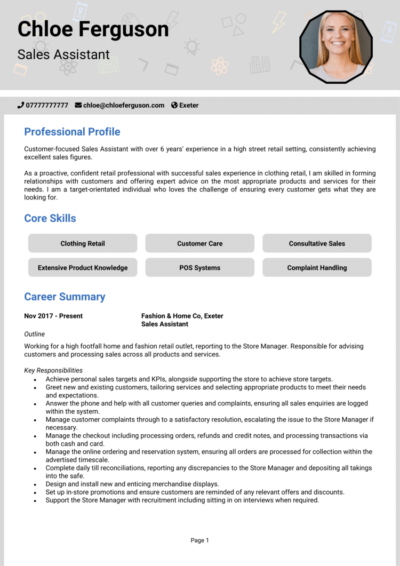Hoping for a new Sales Assistant job? Before you can impress any customers, you’ll need to win over the hiring manager first.
Think of your CV like a store window – if it doesn’t show the recruiter what they want, they’ll move onto the next candidate faster than you move through a shop on Black Friday.
But don’t stress: this guide will give you the tips and the Sales Assistant CV examples to close the deal on your new job.
Sales Assistant CV
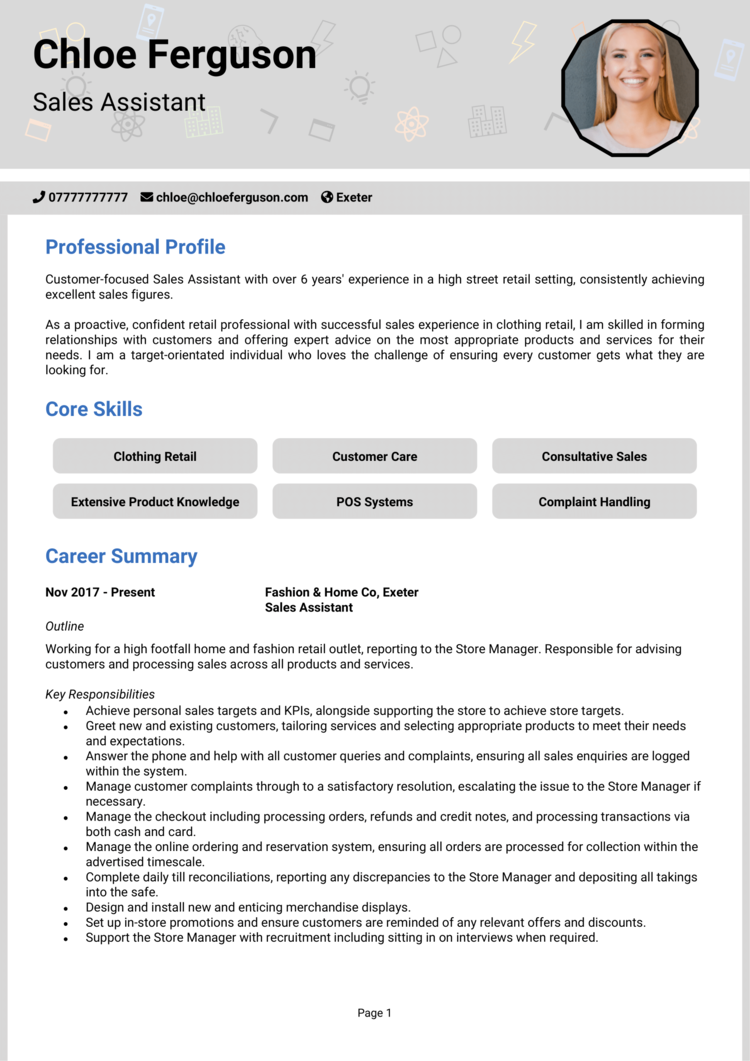
Beauty Sales Assistant CV
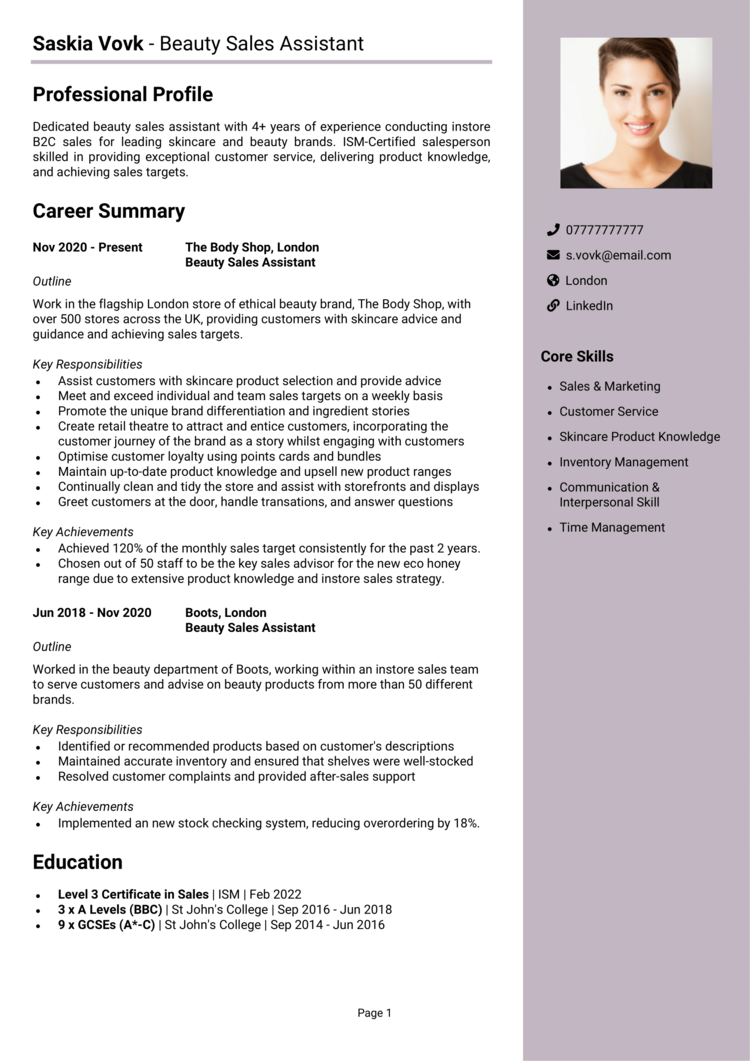
Retail Sales Assistant CV
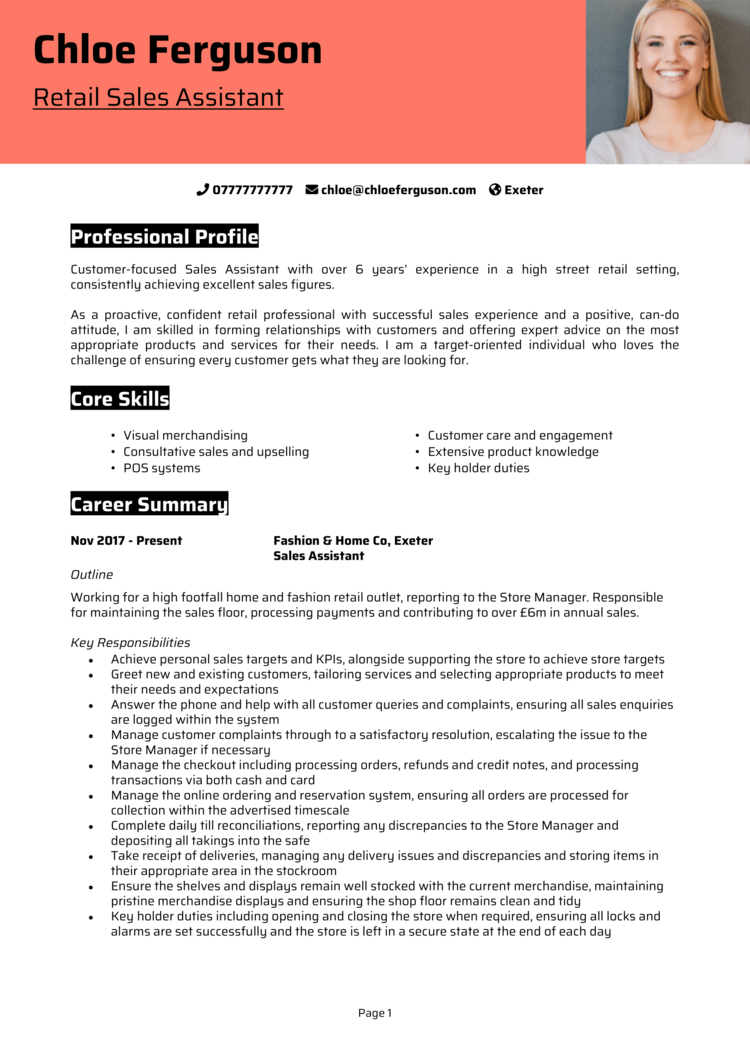
Jewellery Sales Assistant CV
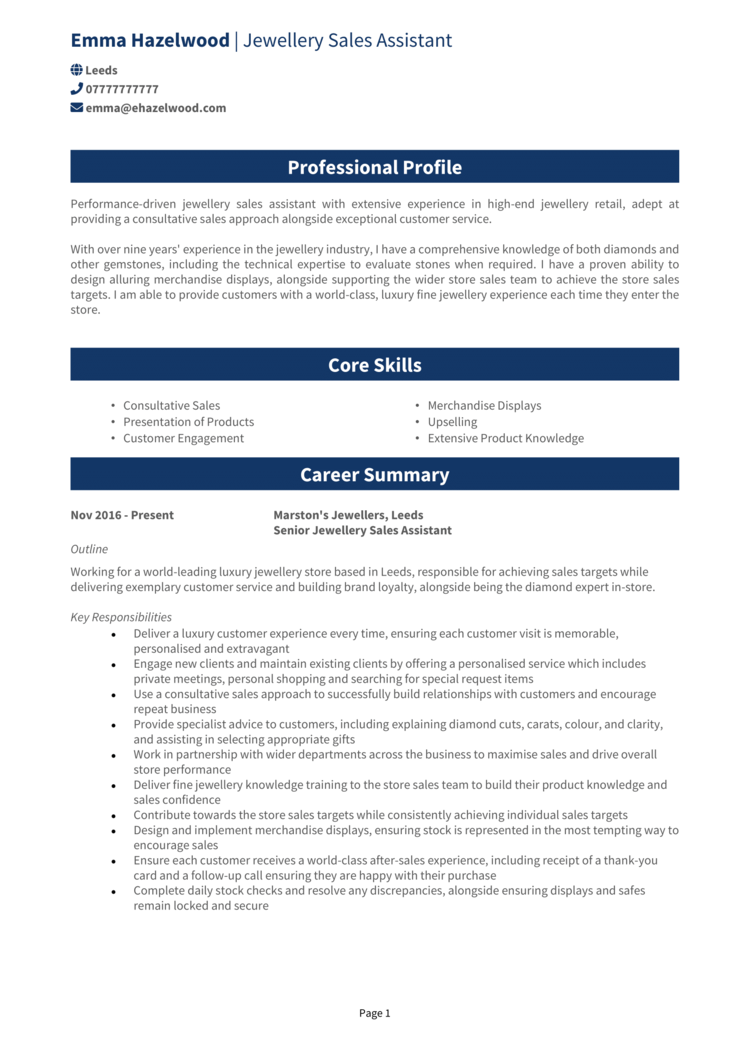
How to write your Sales Assistant CV
Learn how to create your own interview-winning Sales Assistant CV with this this step-by-step guide.
This guide will take you step-by-step through creating the perfect Sales Assistant CV, from structuring and formatting it to listing your experience and expertise the proper way. By the end, you’ll write a CV that turns heads and gets interviews.
Sales Assistant CV structure


A well-organised CV is like a tidy shop – it makes everything easy to find and leaves a great lasting impression. With a clear structure, recruiters can quickly spot why you’re the right fit for the role.
Here’s some tips on how to structure your CV:
- Name and contact details – Place these at the top so employers can get in touch easily.
- CV profile – Start off your CV with a concise summary of your retail experience and your customer-focused approach.
- Core skills – With a few bullet points, list off your key strengths, such as stock management, and how well you can assist customers.
- Work experience – Provide a detailed breakdown of your work history, starting with the most recent job first.
- Education – Include your academic achievements and any retail-specific training or certifications.
- Additional info – You’re also encouraged to include hobbies or interests that show your suitability for the store’s brand or culture.
The correct format for a Sales Assistant CV


Your CV should look as good as the products you’ll be selling. Keep the layout clean and easy to read, so recruiters stay engaged.
Follow these formatting rules:
- Bullet points – Break down details for quick skimming – the recruiter will appreciate it.
- Divide sections – Use clear headings to help make your CV simple to navigate.
- Use an appropriate font – Choose readability over flair, with easy-to-read fonts and an appropriate colour scheme.
- No more than 2 pages – Keep it concise to hold their attention, but with enough length to flex all your relevant skills and experience.
How to create a Sales Assistant CV profile


Your profile is your opening pitch, and it needs to grab attention right away. For a Sales Assistant, this means highlighting your retail experience, product knowledge, and your renowned knack for building relationships with customers.
Sales Assistant CV profile examples
Profile 1
Experienced Sales Assistant with five years in high-street retail, specialising in fashion and accessories. Skilled in providing exceptional customer service, handling stock replenishment, and maintaining visual merchandising standards to enhance the shopping experience. Adept at using EPOS systems to process transactions efficiently.
Profile 2
Reliable Sales Assistant with three years of experience in a busy supermarket environment. Focused on assisting customers, managing inventory, and ensuring the sales floor is well-organised. Proficient in using stock management software and collaborating with team members to achieve sales targets.
Profile 3
Skilled Sales Assistant with seven years of experience in luxury retail, working with high-end jewellery and watches. Expertise in delivering personalised service, building strong customer relationships, and exceeding sales targets. Experienced in CRM software to track client preferences and drive repeat business.
What to include in your Sales Assistant CV profile
Ensure your profile aligns with the specific role. Check the job description for key skills or qualities the employer is after and incorporate those into your profile.
Here’s what your profile should include:
- Where you worked – Mention the types of stores or brands you’ve been part of, as well as any specific teams you worked within.
- Your top qualifications – Highlight any retail or sales training, along with any related certificates, or diplomas.
- Essential sales expertise – Include skills like cash handling, inventory management, or upselling.
- The customers you’ve served – Mention customer types, such as high-volume retail customers or boutique clients.
- Relevant tools you’ve used – Note proficiency with point-of-sale systems or inventory software, if applicable.
Core skills section


Picture the core skills section like the bestsellers display: it showcases your top qualities in a way that’ll grab a recruiter’s attention.
For a Sales Assistant, these might include abilities like handling transactions, managing inventory, or providing excellent customer service. Make sure to tailor this section to suit the job and industry – skills you highlight for a quiet boutique clothing store might differ from a job in a massive Tesco Extra.
Focus on specifics: instead of vague soft skills, emphasise your practical abilities like “stock replenishment” or “working towards sales targets”.
Need help with a sales assistant CV that sells your skills?
Use our CV builder to create a winning application with pre-written content for sales roles, professional templates, and expert advice – all in just a few clicks.
Top skills for your Sales Assistant CV
- Product Knowledge – Developing comprehensive knowledge of the store’s products to provide accurate information and recommendations to customers.
- Point-of-Sale Operations – Efficiently operating point-of-sale systems, processing payments, handling cash, and issuing receipts.
- Merchandising and Stock Display – Arranging products on shelves and displays to maximise visual appeal and drive sales.
- Stock Replenishment – Monitoring inventory levels, restocking shelves, and ensuring product availability for customers.
- Upselling and Cross-Selling Techniques – Identifying opportunities to recommend complementary products or upgrades to maximise sales.
- Customer Assistance – Assisting customers in locating products, answering questions, and providing a positive shopping experience.
- Inventory Management – Participating in stock checks, monitoring inventory accuracy, and reporting discrepancies to management.
- Sales Reporting – Recording daily sales figures and providing reports to management to track store performance.
- Promotional Activities – Supporting in-store promotions, such as product demonstrations or special offers, to attract customers and boost sales.
Showcasing your work experience


Your work experience section is where you really prove your know-how as a Sales Assistant. Recruiters want to see how you’ve applied your abilities in previous roles and the value you’ve brought to other shops.
List your roles in reverse chronological order, starting with your most recent position. Use bullet points to clearly outline your contributions, and if you’re short on experience, highlight relevant volunteer work, internships, or school projects.
How to structure jobs

- Outline – Describe the store or company, your role, and the type of sales environment you worked in. Mention who you reported to and the overall aim of your position.
- Responsibilities – Detail your main duties, such as assisting customers, managing stock, or handling transactions. Use action verbs to emphasise your contributions.
- Achievements – Highlight measurable outcomes, such as exceeding sales targets, improving customer satisfaction, or leading successful promotions – use numbers wherever possible!
Example jobs for Sales Assistant
Assistant Sales Manager | ABC Fashion
Outline
Provided frontline customer support and sales assistance for a leading high-street fashion retailer. Focused on delivering a positive shopping experience and achieving daily sales goals.
Responsibilities
- Assisted customers with product selection, sizing, and styling advice.
- Maintained visual merchandising displays to align with brand standards.
- Handled cash and card transactions using EPOS systems.
- Conducted regular stock replenishment and inventory checks.
- Resolved customer inquiries and complaints efficiently and professionally.
Achievements
- Exceeded monthly sales targets by an average of 15%.
- Reduced stock discrepancies by 10% through improved inventory management.
- Recognised as Employee of the Month twice for exceptional customer service.
Retail Assistant | Luxe Fashion Co.
Outline
Supported the daily operations of a supermarket chain, ensuring the efficient flow of products and a positive customer experience. Focused on assisting shoppers and maintaining a well-stocked, organised store.
Responsibilities
- Restocked shelves and arranged displays to maximise product visibility.
- Provided assistance at the self-checkout area, resolving technical issues.
- Monitored expiry dates to ensure compliance with food safety regulations.
- Collaborated with team members to implement promotions and special offers.
- Operated point-of-sale systems to process purchases quickly and accurately.
Achievements
- Increased sales of promoted products by 20% through effective in-store displays.
- Reduced checkout queue times by 30% by optimising staffing during peak hours.
- Received commendations from management for consistently high customer satisfaction scores.
Sales Assistant | The Body Shop
Outline
Served as a Sales Assistant in a luxury department store, focusing on premium skincare and cosmetics. Provided expert advice and tailored recommendations to high-value clients.
Responsibilities
- Assisted clients in selecting products based on individual needs and preferences.
- Conducted product demonstrations to showcase features and benefits.
- Maintained impeccable presentation standards for display counters.
- Processed sales using CRM-integrated systems to track client purchasing habits.
- Promoted loyalty programmes to drive customer retention and repeat business.
Achievements
- Achieved 120% of quarterly sales targets by building strong client relationships.
- Increased loyalty programme sign-ups by 35% through proactive promotion.
- Recognised as Top Sales Assistant for three consecutive months.
Education and Qualifications


The education section is where you list the qualifications and training that have prepared you for a role in sales. This could include academic achievements or customer service certifications.
For those with little work experience, highlight relevant coursework or training that demonstrates your skills. If you’ve got plenty of experience, this section can be kept brief.
Make sure to list your qualifications in reverse chronological order, starting with the most recent.
What are the best qualifications for a Sales Assistant CV?
- NVQ Certificate in Retail Skills
- Level 2 Diploma in Customer Service
- Highfield Level 1 Award in Retail Knowledge
- Certificate in Retail Operations
- City & Guilds Diploma in Retail Skills


